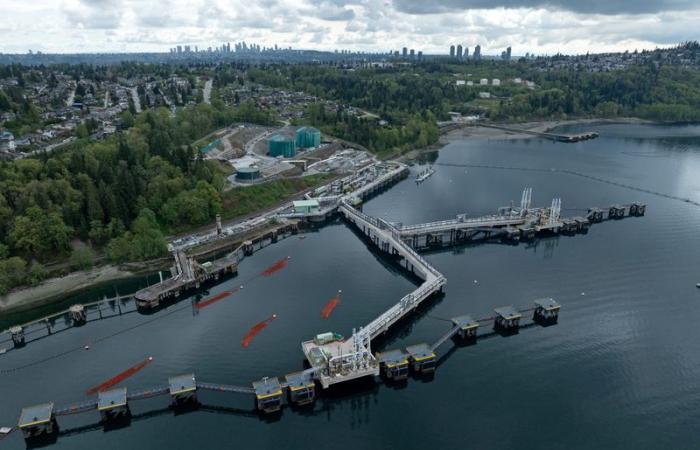About 20 ships loaded crude oil on Canada’s West Coast during the first full month of operation of the newly expanded Trans Mountain pipeline, according to ship tracking data released Sunday, slightly lower than forecasts by the operator.
Cargoes from the pipeline expansion are being closely monitored as the Canadian government wants to sell the $24.84 billion (C$34 billion) line. Questions about oil quality, the economics of the pipeline and loading difficulties have been raised since it came online, sparking concerns about crude oil demand and exports.
The 20 ships loaded were fewer than the 22 ships Trans Mountain had originally planned to load for the month.
Total crude exports from Vancouver were around 350,000 barrels per day, with the last two ships for June loading at the Westridge Marine Terminal on Sunday.
“This first month is just below the 350,000-400,000 bpd we were expecting before start-up. We’re still in the discovery phase, with some kinks being ironed out…but overall it’s is a good start,” said Matt Smith, senior analyst at Kpler.
The ships, partially loaded Aframaxes that could carry about 550,000 barrels each, mainly sailed to the U.S. West Coast and Asia. Some cargoes were loaded onto larger ships for delivery to India and China, according to data providers LSEG, Kpler and Vortexa.
Reliance Industries bought 2 million barrels of Canadian crude for delivery in July, a deal that required four ship-to-ship transfers to load the oil onto a super-large crude carrier off the coast of California. The oil is destined for Sikka, India, where the company operates the world’s largest refining complex.
Phillips 66 acquired a cargo for its Ferndale (Washington) refinery, Marathon Petroleum Corp for its Los Angeles refinery and Valero Energy Corp for its Benicia (California) refinery.
TMX did not immediately respond due to a long weekend in Canada. Phillips 66 and Marathon Petroleum declined to comment, while Valero did not respond to a request for comment.
The market was expecting around 17 to 18 shipments, said Rohit Rathod, market analyst at energy researcher Vortexa.
“Chinese demand was lower than expected and, without Reliance, most of June’s barrels would have remained in the (west coast) region,” Rathod added.
Trans Mountain this month revised the standards for accepting crude oil on its recently expanded network, easing concerns about the acidity and vapor pressure of the line’s crude.
Logistical constraints in a narrow and busy shipping channel after departing from Westridge Dock in Vancouver are also expected to impact loadings. To manage high traffic in the channel, the Port of Vancouver imposes restrictions on transit times.
The expanded Trans Mountain pipeline is about 80 per cent utilized, with some spot capacity. Trans Mountain is projecting a 96 per cent utilization rate starting next year. It can load 34 Aframax ships per month.






